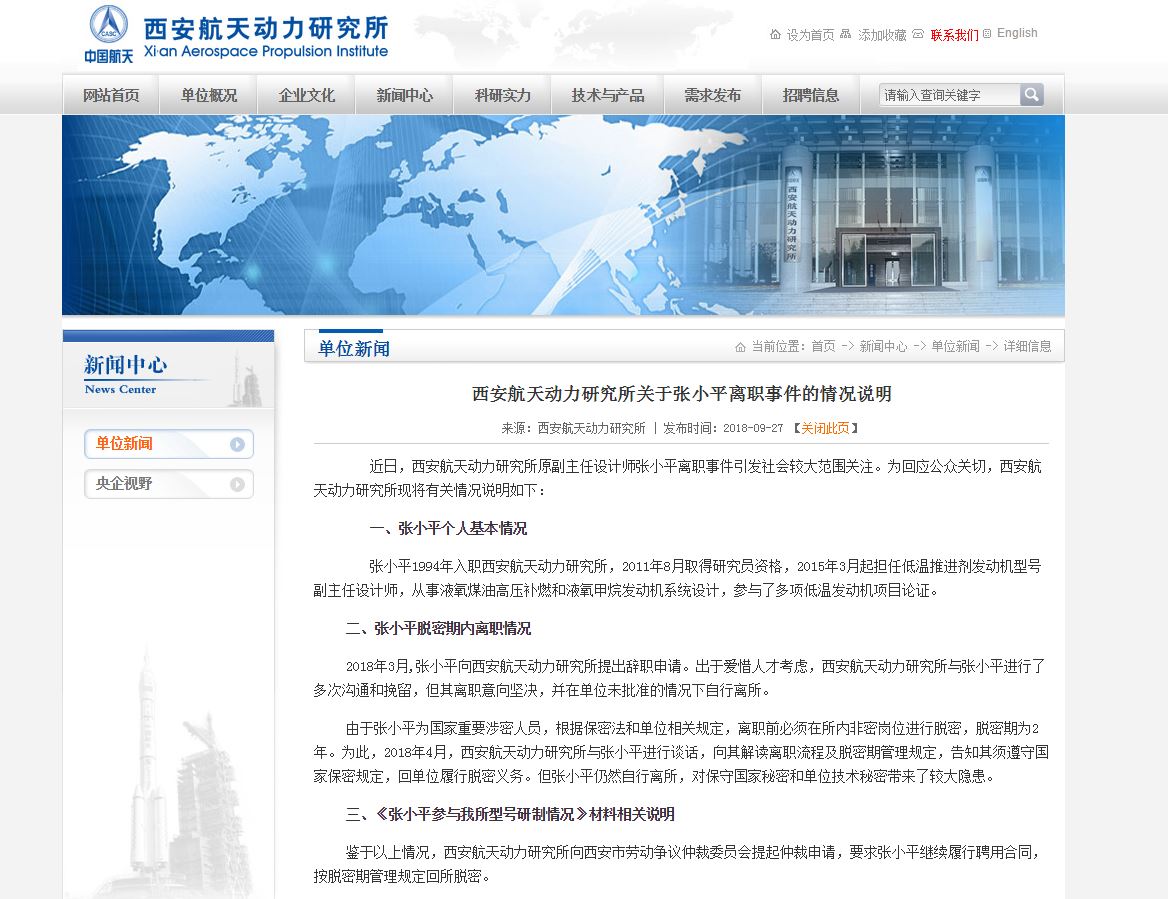Rocket institute admits to exaggerating facts about engineer who quit
By ZHAO LEI | China Daily | Updated: 2018-09-29 07:49

Xi'an Aerospace Propulsion Institute in Shaanxi province, a key rocket engine research arm of the State-owned space giant China Aerospace Science and Technology Corp, admitted to exaggerating facts about a former employee who has allegedly joined a private rocket company.
The institute said in a statement published on its website late on Thursday night that it apologizes for the "negative effects" caused by the "misunderstanding and misinterpretation" that were generated by its earlier exaggerations on Zhang Xiaoping's role in the institute's research and development programs.
In the statement, the institute blamed some employees who represent the institute in a labor dispute arbitration involving Zhang's departure for "using inappropriate words and overstating Zhang's role in research and development programs" in a document sent to the Xi'an Labor Dispute Arbitration Committee.
It promised to improve internal management, be more careful in its work and prevent similar incidents.
On Thursday morning, an article about the institute's employment dispute with Zhang started gaining wide attention on WeChat and soon attracted Chinese media.
The article, published by a user who goes under the name of Mr Zizhuzhang, claims that leaders of the Xi'an institute accepted Zhang's resignation several months ago without careful assessment of the engineer's value but recently "came to realize that Zhang is crucial to an important research program".
It alleged that Zhang now works at a private rocket enterprise in Beijing.
The article posted pictures of what the author said are a copy of an official document submitted by the institute to the Xi'an Labor Dispute Arbitration Committee that explains why the institute insists on Zhang's return.
The copy reads that Zhang took part in a number of rocket engine programs including the 480-metric-ton-thrust liquid oxygen/kerosene engine, which is set to fulfill the nation's future manned missions to the moon. It also says the engineer is "irreplaceable" in these engines' research and that the institute "cannot endure the impact on the country's significant projects resulting from Zhang quitting".
In its statement late on Thursday, Xi'an Aerospace Propulsion Institute explained that its employees who handled Zhang's case used exaggerated words because they "were anxious to make Zhang return to the institute as soon as possible to fulfill his contractual confidentiality obligations".
The statement also noted that institute heads had tried to persuade Zhang-who joined the institute in 1994 and handed in his resignation in March-to stay, as they valued his talent. However, the engineer insisted on quitting and soon left without permission.
According to the institute, Zhang's work at the institute pertained to classified information, so he is subject to a 2-year declassification period stipulated by national laws and regulations. It said Zhang's unpermitted departure has brought risks to national secrets and the institute's technical information.
Liu Zhirang, president of the Academy of Aerospace Propulsion Technology, parent of the Xi'an institute, told Science and Technology Daily on Thursday that though Zhang was a key researcher in several rocket engine programs, his resignation will not likely affect such programs very much because there still are many senior researchers working for them in the academy.
However, he expressed concern over the State-owned space institutes' reduced attractiveness and competitiveness in the contest for talented professionals with private players who have become a rising force in China's space industry.
























